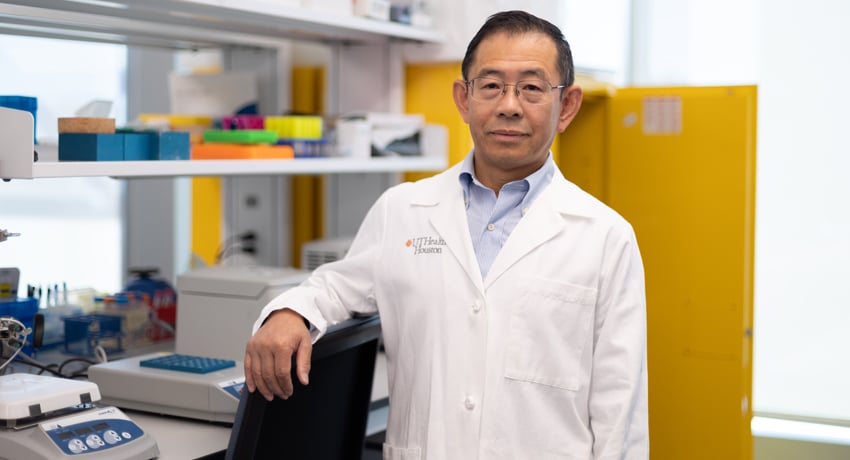The Texas Therapeutics Institute at UTHealth Houston, led by Zhiqiang An, PhD, is expanding into the Texas Medical Center’s newly completed TMC3 Collaborative Building.
The institute, part of The Brown Foundation Institute of Molecular Medicine for the Prevention of Human Diseases with McGovern Medical School at UTHealth Houston, focuses on antibody drug resistance mechanisms, biomarkers for therapeutic antibodies, and antibody drug discovery targeting human diseases.
The new 250,000-square-foot building is set to open at the end of the month and will house translational research initiatives for UTHealth Houston, the Texas Medical Center, The University of Texas MD Anderson Cancer Center, and Texas A&M University Health Science Center.
“It’s an honor to be one of the first labs in the building,” said An, professor of molecular medicine and director of the Texas Therapeutics Institute at McGovern Medical School and vice president of drug discovery at UTHealth Houston. “The Texas Medical Center recognizes the benefit of collaborative work, so the beauty of TMC3 is that it will allow us to work closely with other members in the medical center.”
The Antibody Drug Conjugate Lab led by Kyoji Tsuchikama, PhD, associate professor; the Antibody Drug Discovery Lab led by An and Ningyan Zhang, PhD, professor; and the Antibody Structural Biology and Virology Lab led by Kai Xu, PhD, will be based in the new TMC3 space.
“The institute’s faculty have generated more than 12 novel antibody drug leads that UTHealth Houston’s Office of Technology Management has licensed to eight biotechnology companies, six of which advanced to multiple clinical trials for diseases including breast cancer bone metastasis, solid tumor, spinal cord injury, acute myeloid leukemia, COVID-19, and other diseases,” said Bruce D. Butler, PhD, vice president of research and technology in the Office of Technology Management at UTHealth Houston.
The institute is, in part, supported by grants from the National Institutes of Health, the U.S. Department of Defense, and the Cancer Prevention Research Institute of Texas (CPRIT), which includes two CPRIT CORE grants for antibody drug development totaling $11.2 million. The institute also has support from the biotechnology and pharmaceutical industry and has established collaborations with numerous state and national leaders in drug discovery in both academia and industry.
“I am looking forward to expanding our labs into the new collaborative building, and I am thankful to the medical center and the faculty and staff at UTHealth Houston who support our translational research and believe in our work,” said An, who is the Robert A. Welch Distinguished University Chair in Chemistry.
Media Inquiries: 713-500-3030


